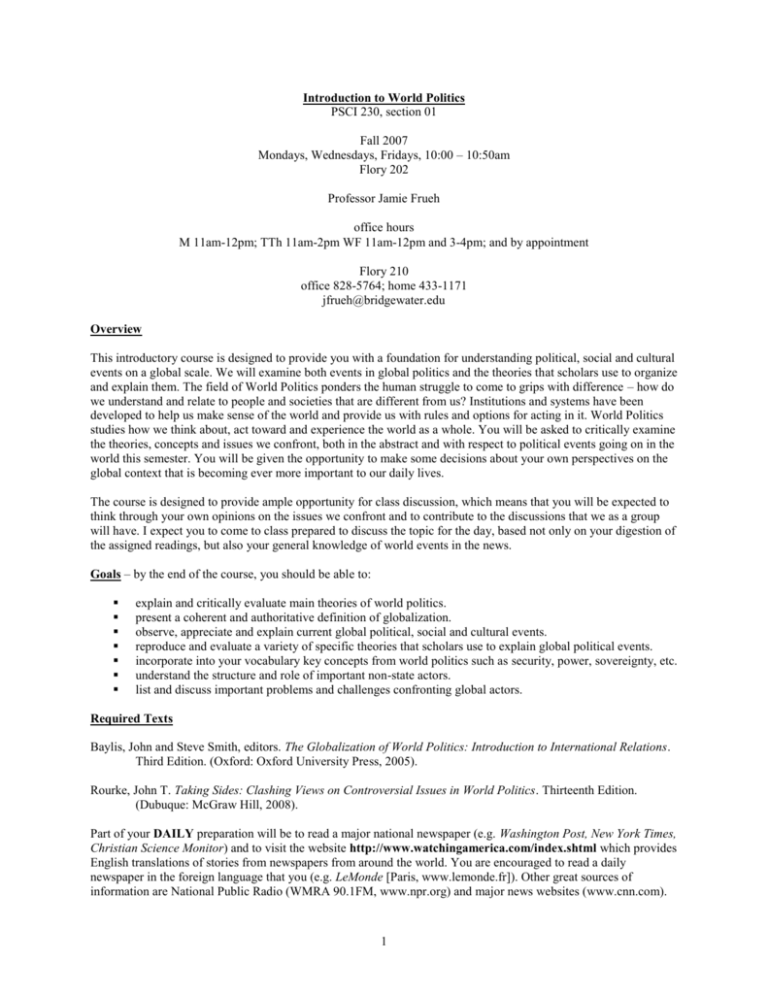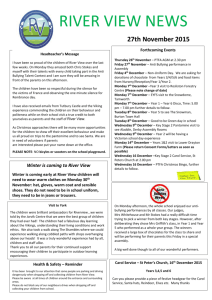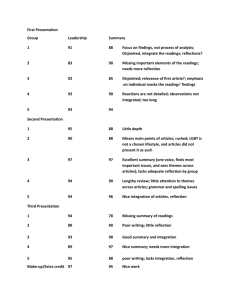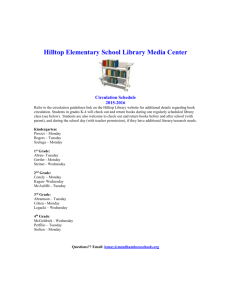Introduction to World Politics
advertisement

Introduction to World Politics PSCI 230, section 01 Fall 2007 Mondays, Wednesdays, Fridays, 10:00 – 10:50am Flory 202 Professor Jamie Frueh office hours M 11am-12pm; TTh 11am-2pm WF 11am-12pm and 3-4pm; and by appointment Flory 210 office 828-5764; home 433-1171 jfrueh@bridgewater.edu Overview This introductory course is designed to provide you with a foundation for understanding political, social and cultural events on a global scale. We will examine both events in global politics and the theories that scholars use to organize and explain them. The field of World Politics ponders the human struggle to come to grips with difference – how do we understand and relate to people and societies that are different from us? Institutions and systems have been developed to help us make sense of the world and provide us with rules and options for acting in it. World Politics studies how we think about, act toward and experience the world as a whole. You will be asked to critically examine the theories, concepts and issues we confront, both in the abstract and with respect to political events going on in the world this semester. You will be given the opportunity to make some decisions about your own perspectives on the global context that is becoming ever more important to our daily lives. The course is designed to provide ample opportunity for class discussion, which means that you will be expected to think through your own opinions on the issues we confront and to contribute to the discussions that we as a group will have. I expect you to come to class prepared to discuss the topic for the day, based not only on your digestion of the assigned readings, but also your general knowledge of world events in the news. Goals – by the end of the course, you should be able to: explain and critically evaluate main theories of world politics. present a coherent and authoritative definition of globalization. observe, appreciate and explain current global political, social and cultural events. reproduce and evaluate a variety of specific theories that scholars use to explain global political events. incorporate into your vocabulary key concepts from world politics such as security, power, sovereignty, etc. understand the structure and role of important non-state actors. list and discuss important problems and challenges confronting global actors. Required Texts Baylis, John and Steve Smith, editors. The Globalization of World Politics: Introduction to International Relations. Third Edition. (Oxford: Oxford University Press, 2005). Rourke, John T. Taking Sides: Clashing Views on Controversial Issues in World Politics. Thirteenth Edition. (Dubuque: McGraw Hill, 2008). Part of your DAILY preparation will be to read a major national newspaper (e.g. Washington Post, New York Times, Christian Science Monitor) and to visit the website http://www.watchingamerica.com/index.shtml which provides English translations of stories from newspapers from around the world. You are encouraged to read a daily newspaper in the foreign language that you (e.g. LeMonde [Paris, www.lemonde.fr]). Other great sources of information are National Public Radio (WMRA 90.1FM, www.npr.org) and major news websites (www.cnn.com). 1 Work Requirements – grades will be calculated out of 1000 points. attendance and participation Attendance is required. Absences will only be excused with a note from a doctor, school official or parent. Points will be deducted for unexcused absences. Absence from more than seven classes for any reason will result in an automatic failure for the course. You are also expected to participate in our discussions based on your understanding of the assigned readings. reflections - 200 points (20 points each) Ten times over the course of the semester, you will submit to me via email a reflection of approximately 200 words on the reading assigned for that day. You can do a reflection for any day that readings are assigned or for a seminar day. Reflections should not summarize, but demonstrate thoughtful, critical engagement with concepts and themes. Reflections should draw connections to your own experiences, knowledge and intuition. They should be emailed to me at least an hour before class on the day we will cover the reading that inspired your reflection. I will not accept reflections turned in after the class period for which the reading is assigned. Reflections will be graded on your effort at critically engaging the text in a thoughtful way, not on the substance of your ideas. position papers – 200 points (100 points each) You will submit two, four-to-five-page position papers exploring a current issue of importance to world politics, one on Monday, October 15 and one on Monday, November 12. The professor will assign the general topics for these papers approximately a month in advance. The research will be conducted primarily through daily reading of newspapers and the students will be given the specific question to be answered a week before the paper is due. small group work – 200 points (40 points for each report) During the semester, you will interact with members of a small group assigned by the professor. Periodically I will give you class time to discuss an issue among yourselves. For each discussion, the group will submit a summary of the discussion and any conclusions that it produced. The summaries should be approximately 300 words (approximately a page) in length. In addition to the grades for the reports, at the end of the semester the other members of your group will evaluate your efforts in the small group. These evaluations can raise or lower your final grade for the course. tests – 200 points (100 points each) On Friday, September 28 and Friday, November 2 you will take in-class tests over the readings and lectures. Each test will cover roughly one-third of the semester; the tests are not cumulative. The tests include multiple choice, short answer and short essay questions. final exam – 200 points On Monday, December 10 at 8am, you will sit for a final exam. The first part of the exam will be similar in format to the first two tests and will examine your mastery of the material from the last third of the semester. The second part of the exam will be essay questions that will ask you to integrate ideas and information from the entire semester. 2 Grading Scale You will be graded out of 1000 points according to the following scale: A A minus B plus B B minus C plus 930 to 1000 points 900 to 929 points 870 to 899 points 830 to 869 points 800 to 829 points 770 to 799 points C C minus D plus D D minus F 730 to 769 points 700 to 729 points 670 to 699 points 630 to 669 points 600 to 629 points 599 and below Academic Integrity Students are expected to be aware of and abide by the Bridgewater College Honor Code, specifically as it relates to the act of plagiarism, which the student handbook defines as “the use of another person’s ideas or thoughts, which are not common knowledge, without acknowledging the source.” The policy specifically prohibits copying paragraphs or even central ideas and claiming them as your own, in addition to the more obvious violations such as buying papers off the web or turning in someone else’s work as your own. Violations will be dealt with swiftly and severely and could result in failure of the course or expulsion from the college. If you are in doubt, cite the source. Course Structure – B&S refers to the Baylis and Smith text and Rourke refers to the Taking Sides text. Part I: Introductions Week 1 – September 5 – 7 W F Introductions, syllabus, teaching philosophy, goals of the course International Relations and World Politics For Friday, read: B&S introduction, pages 1-13. Part II: Theories of World Politics Week 2 – September 10 – 14 M W F Global politics For Monday, read: B&S chapter 1, pages 19-38. Liberalism For Wednesday, read: B&S chapter 8, pages 185-201. Realism For Friday, read: B&S chapter 7, pages 161-179. Week 3 – September 17 – 21 M W F Evolution of theories: the “neo-”s For Monday, read: B&S chapter 9, pages 205-222. Marxist theories of world politics For Wednesday, read: B&S chapter 10, pages 225-247. Constructivism For Friday, read: B&S chapter 11, pages 252-269. 3 Week 4 – September 24 – 28 M W F The world today For Monday, read: B&S chapter 6, pages 131-155. Seminar day and test review FIRST EXAM Part III: Key Concepts, Structures and Processes Week 5 – October 1 – 5 M W F Nationalism For Monday, read: B&S chapter 23, pages 521-536. Security For Wednesday, read: B&S chapter 13, pages 297-322. The war in Iraq For Friday, read: Rourke issues 7 and 12, pages 102-113 and 204-225. Week 6 – October 8 – 12 M W F Fall Break Gender For Wednesday, read: B&S chapter 30, pages 669-686. International law For Friday, read: B&S chapter 15, pages 349-366. Week 7 – October 15 – 19 M W F The United Nations For Monday, read: B&S chapter 18, pages 405-422. First position paper due at the beginning of class. Issues in global governance For Wednesday, read: Rourke issues 16 and 17, pages 292-324. European and regional integration For Friday, read: B&S chapter 26, pages 579-595. Week 8 – October 22 – 26 M W F Transnational actors and international organizations For Monday, read: B&S chapter 19, pages 425-445. International Political Economy For Wednesday, read: B&S chapter 14, pages 325-345. The World Trade Organization For Friday, read: Rourke issue 9, pages 134-161. Week 9 – October 29 – November 2 M Global communications For Monday, read: B&S chapter 28, pages 622-641. W Seminar day and test review F SECOND EXAM 4 Part IV: Issues and Problems Week 10 – November 5 – 9 M W F Poverty, development, and hunger For Monday, read: B&S chapter 29, pages 645-667. The environment For Wednesday, read: B&S chapter 20, pages 451-475. Global warming For Friday, read Rourke issue 19, pages 346- 359. Week 11 – November 12 – 16 M W F Film: “Ambush in Mogadishu” Second position paper due at the beginning of class. Humanitarian Intervention For Wednesday, read: B&S chapter 25, pages 555-576. Film: “Triumph of Evil” Week 12 – November 19 M Human rights For Monday, read: B&S chapter 31, pages 689-702. Thanksgiving Break Week 13 – November 26 – 30 M W F Nuclear proliferation For Monday, read: B&S chapter 22, pages 499-517. Terrorism For Wednesday, read: B&S chapter 21, pages 479-495. The War on Terror For Friday, read: Rourke, issue 13, pages 226-253. Week 14 – December 3 – 5 M W Globalization, community and order For Monday, read: B&S chapters 32 and 33, pages 709-740. Seminar day and exam review Final Exam: Monday, December 10, 8am 5 How to Write a Reflection Step 1: READ THE ASSIGNMENTS! In the course of reading you will pick up knowledge. You won't be able to help it. But the point of the reading assignments is to understand things. This should be EXCITING. If you think about the reading as so many pages to trudge through, you are much less likely to CREATE IDEAS. Engage the author in a kind of conversation. Step 2: Take some notes while you read – nothing extensive just what seems most important to the author's point. Write down what you think is interesting. Your notes should just be things around which thoughts can coalesce either while you're reading or afterwards. These notes will be quite valuable when it comes time to study for the exam. If you have the notes, you won’t have to re-read everything – you’ll just be able to look over your notes Step 3: Sit back and THINK about the readings for 15 or 20 minutes before you try to write anything. You are not done reading when you finish the last page. You must leave yourself some time to process what you have just read. Scribble some notes. Put things in your own words. Brainstorm. Try to summarize the main points of the readings and figure out how they relate to one another. Also, think of interesting connections to your childhood or to your day or to some rerun of the Simpsons. Thinking is not always a linear process. Work at engaging each author. If the process of reading is like a conversation, the reflection is your opportunity to relate that conversation to a third party. The point is there is no right answer. I will grade you on whether or not you seem to have thought about the readings. You are more than welcome to talk about your ideas with each other AFTER you have written your reflections, but I want each of you to engage the readings on your own. Step 4: Write up your ideas in 200 words or so. Pick something – anything – from the readings that made you think and write about it. Make sure you relate your ideas to the readings explicitly, but you only have to refer to the passage that made you think. Do not rehash what the author said. I have read the book too. If you spend too much space telling me what we both already know you will fail the reflection. I want to know what you thought was cool and why. What connections did you make to other things we have discussed in class or with your ideas or experiences? I want you to realize that reading is mental work. The reflection is the evidence that you have worked. Step 5: Email the reflection to me. Cut and paste your reflection into a new message and send it to jfrueh@bridgewater.edu at least one hour before class. You must turn it in before we discuss the pages that sparked your thoughts. I do not accept late reflections. Each reflection is worth up to 20 points, or 2% of your final grade. 6








